When I went to class yesterday, this is what I found:
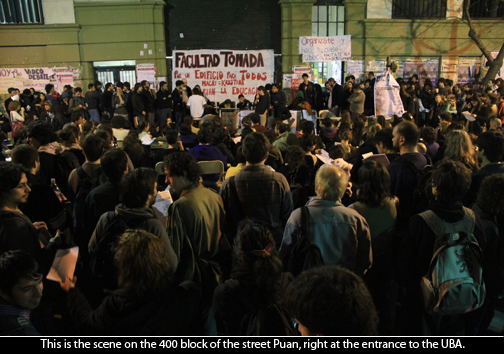
The students of the University of Buenos Aires (UBA) decided on Sept. 7 to occupy the Facultad of Filosof�a y Letras, which means that most classes are canceled and students are now sleeping overnight in the building to make sure authorities don�t close and lock the doors.
Last night, I was one of those students. I’d never occupied a building before and I count it as a valuable part of my cultural experience in Buenos Aires.
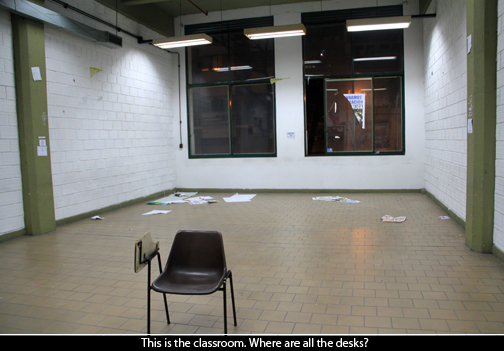
The student occupation of the UBA is part of a broader student movement that includes the occupation of three other university buildings and 24 high schools across the city.
What follows in this entry is only one side of that story, and while biased, it provided me, as an American student, with valuable food for thought.
(**A quick note: In this “occupation,” all chairs are removed from classrooms and the doors are open so the public can walk through it freely. Teachers can even still hold class, albeit it in the open air or in a hallway, which is what my teacher decided to do next week. Police aren’t allowed inside, though there weren’t any present — it was all very peaceful.)
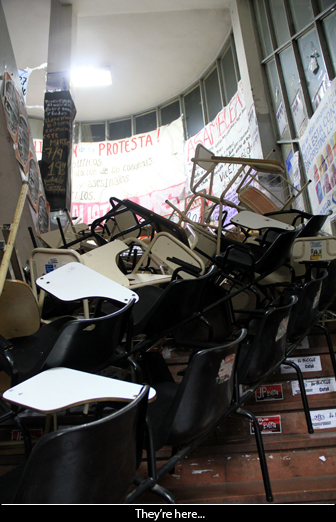
It is absolutely free — that’s right, free, except for the cost of books, transportation and such — to attend the public university here. And while the buildings of the UBA are old, don’t have running sink water, etc., it’s still one of the most prestigious schools in Latin America. That’s admirable to me, that in the past they fought for a free university, acquired it, and now they want to improve on its conditions.
That said, students are making a direct appeal to the city and national governments for a larger education budget. They’ve apparently taken several measures to get its attention, including letter writing, street protests, etc. The occupation of these buildings, then, isn’t just emotional overreaction or fun and games — it’s seriously a last-ditch effort.
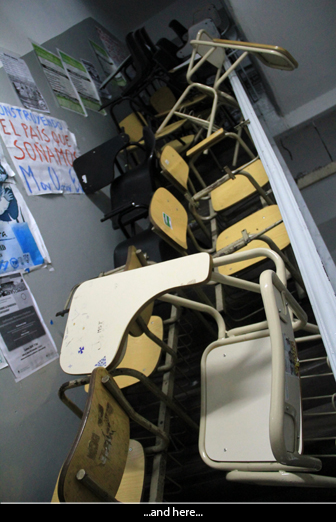
For the record, I do believe in the UBA’s reputation. The class I take there, “Approximation to a Marxist analysis of culture, art and ideology,” is taught by an excellent teacher, filled with passionate — and very intelligent — students and includes an insane amount of reading every week. And I’ve learned a lot.
To be honest, the quality of the students here — again, only in my experience — has made me question the real quality of education in the states and whether we’re actually reaching people. It’s hard to describe, but every porte�o I’ve met has a certain edge that just isn’t so common in the states.
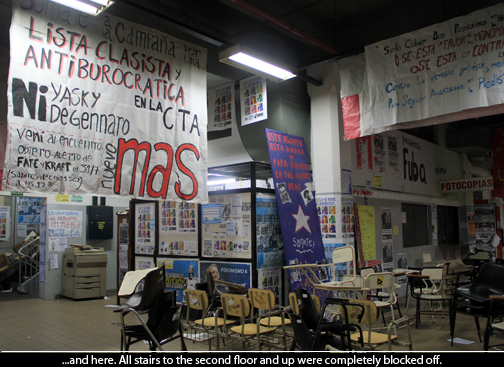
A comment earlier on this blog, I think, captures the essence of what I’m saying — a lot of students in the U.S. learn Spanish not because they’re genuinely interested in using it to connect with the culture, but because it’s a marketable skill. I’m generalizing here, but I feel U.S. students also treat education in general more as a commodity for getting ahead than as a tool to be used for the betterment of society. Maybe I just feel more at home with left-wingers. That could be the case, too.
Whatever it might be, this great concern for social issues is something that has Ignacio Gerola, a third-year student studying anthropology, strongly against the city government, headed by Mauricio Macri, which funds the private sector while cutting the budget for public one.

“[Private education] generates more social inequality,” he said. And rather than teaching students to look for the betterment of society, it teaches them to “function for the corporations.”
My journalism major functions this way — learn how to tell the best story to draw the biggest audience to make the most money for your newspaper. Other journalistic “responsibilities” might enter into the equation, but at its core (at least in my classes so far) the major teaches us to operate within the system and perpetuate it without giving thought to how our role as journalists might be problematic, or how that system might be flawed.
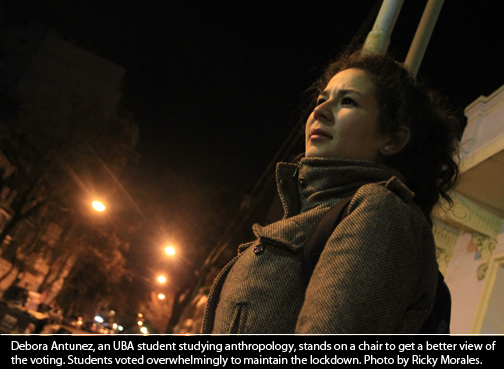
Maybe this crosses the border into politics and has nothing to do with intercultural understanding. Then again, maybe it has everything to do with why some people abroad just don’t like the U.S.
Anyway, about 500 people, probably more than that, were gathered in front of UBA to vote. They voted on a variety of things, most importantly on whether or not to continue occupation of the school into the night.
Among the UBA’s demands are a student cafeteria, a daycare, more classrooms (due to lack of space, students often sit on the floor), construction on the Sociales building (apparently in bad shape — a large piece of glass fell in its central hall and by dumb luck no one was killed) — and a swift NO to any effort at privatization.
The UBA has a student government comprised of elected students, although the student body makes all of its decisions democratically, leaving the government to head logistics rather than lead the students of its own accord. With more than 15,000 students taking classes there, though, the 500 that attended seems small.
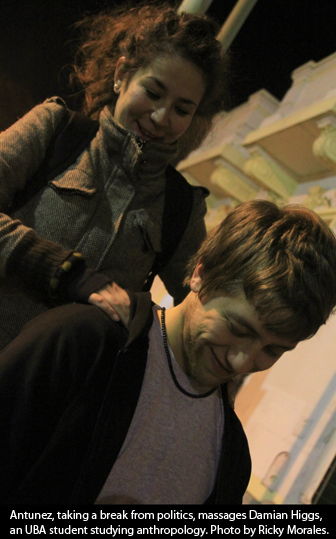
“The important thing is that these measures bring together more people, that they become involved with politics,” Marco Schirno said in response to this. He’s a second-year student studying anthropology.
Gerola, who I mentioned above, was confident that most students not in attendance were in agreement
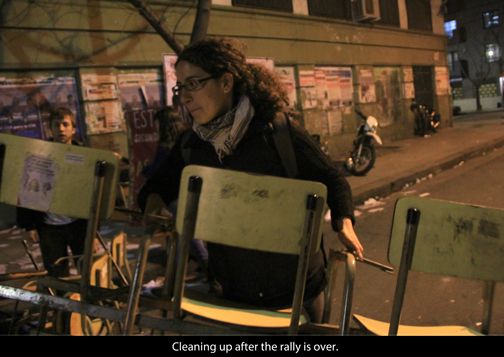
The majority of students here work, many full time jobs, and I can understand why they wouldn’t come in person to the building, especially if they’re politically wary or not as passionate as the bunch in the video above.
Now I can’t say for sure, but running water, soap and paper towels in the bathrooms here would be nice — I’m sure every student can agree with that. Also, the demands stated above seem reasonably well thought out, and even the president, Cristina Fern�ndez de Kirchner, supports the student movement (though they say this is only in words and not in action).
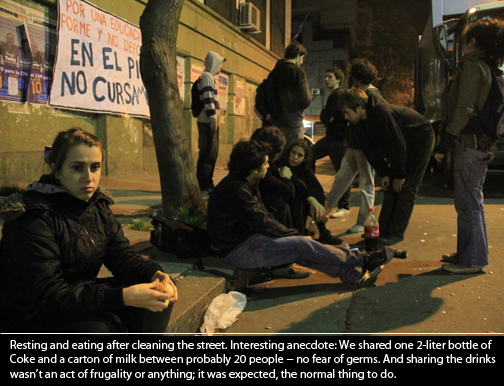
And I was seriously impressed by the students here. They were serious. This isn’t a party for them. After organizing dinner for the 100 students that ended up staying, they promptly formed committees to deal with various issues throughout the occupation, including ones for cleaning, security, public relations, food, art (creating flyers, etc) and women (to ensure that they were being represented properly) .
Afterward, most students slept on the floor, including me. It wasn’t like, let’s have a slumber party. It was more like, we’re occupying a school. The room where most people were sleeping was pitch black, so I couldn’t get a photo of that, but I have this one:

I’ll have to research this more, but I’m left with this thought: Reportedly the United States has the best system of higher education in the world, but what does that mean? Most research? Most graduates? Is that how we should measure it? What are we learning?
My thoughts are also only formulated from my experience at Penn State. I’m now taking classes at both the UBA, incredibly left, and the Universidad de Empresiarales y Sociales (UCES), which is center-right. I’ll be comparing them throughout the semester.
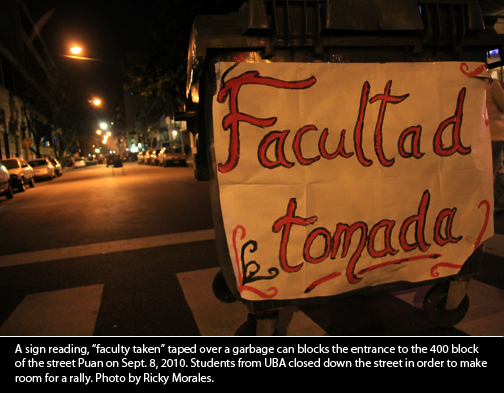
Location: Avenida Paraguay, Buenos Aires, Argentina
Loading map...



Quality entry! I hear you on strikes and education. Although, I must say that if these strikes are so common, I’m not really sure how they’d get the education they need. I know that I’ve already missed 8 hours of tango because of strikes. Which just makes me frustrated because I actually want to learn, and this is incredibly hindered by strikes. Either way, I feel you got a really cool view of the strike. I also wrote a little about the IUNA strike, and I’m going to link to yours if you don’t mind. I know we’re on the same main site, but for those of my friends/family who only go to my entries, I feel they would enjoy seeing this too!
This seems very intense Ricky! but coming from a Latinamerican country is not news for me, because like I told you once, I had also been a participant of this events… is full adrenaline…that is for sure. Please be careful and don’t expose yourself too much because when there is police involvement they don’t look for foreing students or loco studentes…. they just go and try to disperse and to end up the gatering.
This was a truly interesting piece to read, and it will also be intriguing to hear about the aftermath. Your point about the US education system being the best is thought-provoking as well; I’m beginning to wonder whether this is true, seeing the differences in the French universities (where it is basically free to attend, but there are no student services/activities/clubs, and the professors are employed by the goverment). Obviously this system poses some problems too. But what’s most important is how much the students in Argentina seem to care – PSU students don’t often hold this sort of protest or demonstration, and if they do, it’s generally not for something of extreme importance. This isn’t to discount PSU students, but it’s nonetheless true. Education is often a means to an end, but that’s not grasping the entire point.